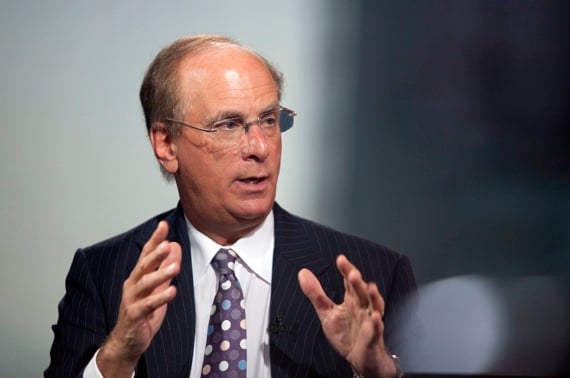BlackRock Inc.'s Chief Executive Officer Larry Fink said he's more bullish on U.S. equities than bonds because companies are benefiting from the weak dollar and have surplus cash to invest for growth.
“We love equities, we love dividend stocks,” Fink said in a Bloomberg Television interview today in Hong Kong. “You own Treasuries because you're worried about the world and the future, but if you believe the world is a good place to invest for the long cycle, you have to be in equities.”
Fink, one of the co-founders of
BlackRock in 1988, built what is now the world's biggest asset manager through acquisitions including the purchase in December 2009 of Barclays Global Investors. He said in a March 3 interview that he's a “big buyer” of the U.S. dollar, doesn't see a “bear market” in bonds and would buy Treasuries if yields rise above 4 percent.
The 10-year Treasury yield was little changed at 3.08 percent as of 12:04 p.m. in Tokyo, according to Bloomberg Bond Trader prices. The rate slid to 3.0516 percent earlier today in Asia, matching the lowest level this year. Yields will advance to 3.84 percent by year-end, according to a Bloomberg survey of financial companies, with the most recent forecasts given the heaviest weightings.
“If you just could get a 4 percent growth in equity markets and a 3.5 percent dividend, you're earning 7.5 percent, basically approaching what your liabilities are,” Fink said today. “Global liabilities are anywhere from 7.5 percent to 8 percent and you can't earn your liabilities earning 3.5 percent in 10-year Treasuries.”
Pimco's View
Fink said he “would not be surprised” to see 10-year Treasuries yielding between 3.5 percent to 3.6 percent by the end of the year.
Bill Gross, who runs the world's biggest bond fund at Pacific Investment Management Co., is increasing his bet against U.S. government debt. Pimco's $241 billion Total Return Fund had minus 4 percent of its assets in government and related debt at the end of April, versus negative 3 percent in March.
Cash and equivalents accounted for 37 percent of holdings, the largest component, the Newport Beach, California-based company said in a portfolio holdings statement on its website. Pimco's Total Return Fund can have a so-called negative position by using derivatives, futures or by shorting. Shorting is borrowing and selling an asset in anticipation of making a profit by buying it back after its price has fallen.
Europe's Woes
Europe's financial problems aren't confined to Greece and a reorganization of the continent's banking system is necessary, Fink also said in the interview. Europe is going to need a “giant TARP,” Fink said, referring to the Troubled Asset Relief Program that the U.S. introduced to rescue financial firms. BlackRock advised the Federal Reserve on illiquid debt portfolios during the height of the financial crisis.
Futures on the S&P 500 indicate shares may extend a three- day rally when markets resume trading today after yesterday's Memorial Day holiday in the U.S. The gauge dropped in each of the last four weeks, the longest losing streak since February 2010. U.S. economic data this week is forecast to show the increase in U.S. payrolls this month slowed from April and the Institute for Supply Management's factory index likely fell to the lowest level since October.
“The private sector truly is benefiting from the weak dollar, but still has $2.5 trillion in cash,” Fink said. “U.S. companies are stronger today than they ever have been. Their balance sheets are robust as ever and they're starting to put that money to work.”
Public Sector
If the U.S. government were to reduce its deficit by $4 trillion over a 10-year period, economic growth would slow by 1 percent per annum, Fink said, adding he sees no evidence for more quantitative easing.
“And so what I've told Democrats and Republicans in Washington is that for the first time, the public sector is not going to be the growth engine,” he said. “The public sector will be a destroyer of growth and for the U.S. to grow above trend, the partnership between government and business is even more important. The private sector has the energy and the financial wherewithal to grow above trend.”
BlackRock, which manages about $3.65 trillion in its stock, bond and hedge funds, as well as its iShares exchange-traded funds, began as a fixed-income firm. In 2005, it bought State Street Research & Management to add more stock, real estate and hedge funds. In 2006, it purchased Merrill Lynch & Co.'s money- management unit and in 2008 it acquired a division of Quellos Group LLC to add hedge-fund assets.
Its $15.2 billion purchase of Barclays Global Investors in 2009 was its largest transaction and added passive funds such as ETFs to its active stock and bond strategies.
Asia Plans
Fink said BlackRock had “huge plans” to grow in Asia.
“Asia is one of our key growth elements over the next three to four years,” he said. “We've made a strong living through the exportation of dollar-based assets here to Asia. I believe our future will be much more towards the managing of local-currency products.”
As policy makers in Beijing curb lending, “more and more Chinese companies are going to the corporate bond market. We're going to be the beneficiary as those capital markets grow,” Fink said.
--Bloomberg News--







